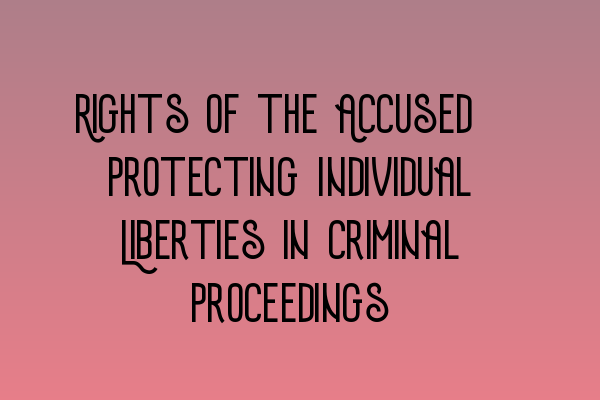Rights of the Accused: Protecting Individual Liberties in Criminal Proceedings
When a person is accused of a crime, it is paramount that their individual liberties are protected throughout the criminal proceedings. The legal system in the UK ensures that individuals accused of crimes have a set of fundamental rights that aim to maintain fairness, justice, and respect for human rights.
The Presumption of Innocence
At the heart of any criminal proceeding is the presumption of innocence. Every accused person is considered innocent until proven guilty in a court of law. This principle guarantees that individuals are not unfairly judged or penalized before their guilt has been proven beyond a reasonable doubt.
The LLC Formation Made Simple: Step-by-Step Guide for UK Entrepreneurs is an important resource for UK entrepreneurs looking to establish a limited liability company.
The Right to Legal Representation
One of the crucial rights afforded to the accused is the right to legal representation. This ensures that individuals have access to expert legal advice and are able to present their case effectively. Solicitors who specialize in criminal law, such as those at SQE Criminal Law & Practice Law UK, provide essential support to their clients by navigating complex legal processes and safeguarding their rights throughout the proceedings.
Fair Treatment and Due Process
The accused also has the right to fair treatment and due process. This includes a fair and public hearing free from any discrimination, the right to be informed of the charges against them, and the right to cross-examine witnesses. These rights are vital in upholding justice and ensuring that individuals are not subject to arbitrary actions.
For a comprehensive overview of business regulations in the UK, refer to the article Business Regulations in the UK: A Comprehensive Overview.
Protection Against Self-Incrimination
The right against self-incrimination is a crucial safeguard for the accused. It ensures that individuals cannot be compelled to provide evidence against themselves, protecting them from potential abuse and coercion. This right enables the accused to maintain their innocence without fear of self-damaging statements.
The Right to a Speedy Trial
Another important right of the accused is the right to a speedy trial. This ensures that individuals are not held in pre-trial detention for an excessive period of time. The right to a speedy trial is crucial in minimizing the impact of criminal proceedings on the accused and preventing undue delays that can compromise the fairness and effectiveness of the trial.
For strategies and resources to help you prepare for the SQE exam, check out Preparing for the SQE Exam: Strategies and Resources for Success.
Protection Against Double Jeopardy
The principle of double jeopardy protects the accused from being tried for the same offense more than once. Once a person has been acquitted or convicted of a crime, they are protected from being prosecuted again for the same offense based on the same set of facts. This principle ensures that individuals are not subjected to multiple trials for the same alleged wrongdoing.
Conclusion
The rights of the accused in criminal proceedings are essential for protecting individual liberties and maintaining a fair and just legal system. From the presumption of innocence to the right to legal representation, fair treatment, and protection against self-incrimination and double jeopardy, these rights play a crucial role in upholding justice and safeguarding the fundamental principles of the legal system.
For SQE workshops and webinars to accelerate your exam preparation, visit SQE Workshops and Webinars: Accelerate Your Exam Preparation.
For UK solicitors seeking insights and practices in Delaware corporate law, our article on Delaware Corporate Law for UK Solicitors: Key Insights and Practices will be a valuable resource.
